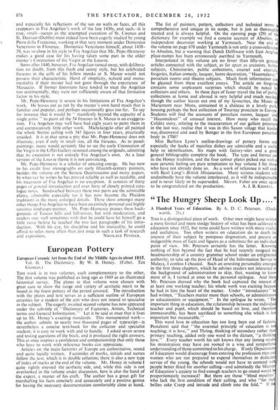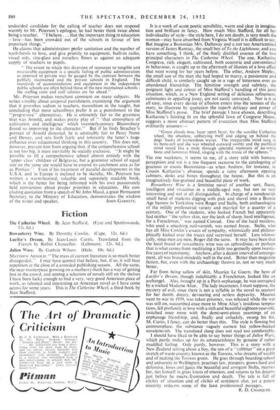" The Hungry Sheep Look .Up
I)
• • • •
THIS is a distinguished piece of work. Other men might have written a more formal and more stodgy history of what has been achieved in education since 1852, but none could.have written with more vitality and usefulness. Too often writers' on education do to death the interest of their subject by pompous dogmatism, and present an indigestible mass of facts and figures as a substitute for an individual point of view. Mr. Peterson certainly has the latter. Knowing nothing of him beyond the fact that he had recently resigned the headmastership of a country grammar school under an enlightened authority, to take up the post of Head of the Information Service in Malaya, I confess I cheated. Such an arresting personality emerged in the first three chapters, which he advises readers not interested in the background of administration to skip, 'that, wanting to know more of it, I turned at once to the personal epilogue. And there Mr. Peterson showed why the book had captured the interest o at least one working teacher; his whole work was exciting because he had in him the heart of the matter. Under "introductory" he had written, "Teachers matter more than schools, or administrators or educationists or equipment." In the epilogue he wrote, "Th important thing in education, the relationship between the individu teacher and pupil, which should be based on love, and therefor immeasurable, has been sacrificed to something else which is le important but measurable."
This word love in education has too long been out of fashion Pestalozzi said that "the essential principle of education is no teaching; it is love," and Tilling, thinking of secondary rather tha primary teaching, added only one word to the dictum, "a thinkin love." Every teacher worth his salt knows that any lasting resul his ministration may have are rooted in a wise and sympatheti understanding of those committed to his charge. If only Departmen of Education would discourage from entering the profession men an women who are not prepared to expend themselves in dedicate service of the young, the schools would not have to contend wit people better fitted for another calling—and admittedly the Ministe of Education's anisiety to find enough teachers to go round would proportionately increased! But there are those "blind mouthes' who lack the first condition of their calling, and who "for the bellies sake Creep and intrude and climb into the fold." If t undecided candidate for the calling of teacher does not respond warmly to Mr. Peterson's epilogue, he had better think twice about being a teacher. "I believe ... that the important thing in education —love—has been crowded out of the schools in favour of less important things."
He claims that administrators prefer sanitation and the number of wash-bowls to love, and give priority to equipment, built-in radio, visual aids, vita-glass 'and noiseless floors as against an adequate supply of teachers to pupils.
" The extent to which this diversion of resources to tangible and measurable equipment is a specific failing of public administration as opposed to private may be gauged by the contrast between the publicly maintained and the private schools in England. The standards of accommodation and equipment in the independent public schools are often behind those of the new maintained schools : the staffing ratio and staff salaries are far ahead." •
Mr. Peterson makes trenchant comment on many subjects. He writes smsibly about corporal punishment, examining the argument that it provokes sadism in teachers, masochism in the taught, but concluding that most schoolboys prefer it as a punishment to the "progressive" alternatives. He is eminently fair to the greatness that was Arnold, and makes pretty play of " `that atmosphere of cultivation and intelligence' which twentieth-century Bloomsbury found so improving to the character." Buell- he finds Strachey's portrait of Arnold distorted, he is admirably fair to Percy Nunn and Dewey, and sets forth fairly and tolerantly the latter's huge influence over educational thinking in this country. This does not, however, prevent him from arguing that, if the comprehensive school is not too big, it must inevitably be socially exclusive. "It might be possible to fill a comprehensive school almost entirely with the `upper class' children of Belgravia; but a grammar school of equal size on the same site would have to extend its catchment area as far as Pimlico." Even if his treatment of parallel developments in the U.S.A. and in Europe is inclined to be sketchy, Mr. Peterson has written a warm-hearted, valuable and supremely readable book, which is the better for being informed with his own passionately held convictions about proper priorities in education. His con- cluding quotation from a speech of Sir John Maud, a great Permanent Secretary to the Ministry of Education, demonstrates the wisdom



























 Previous page
Previous page